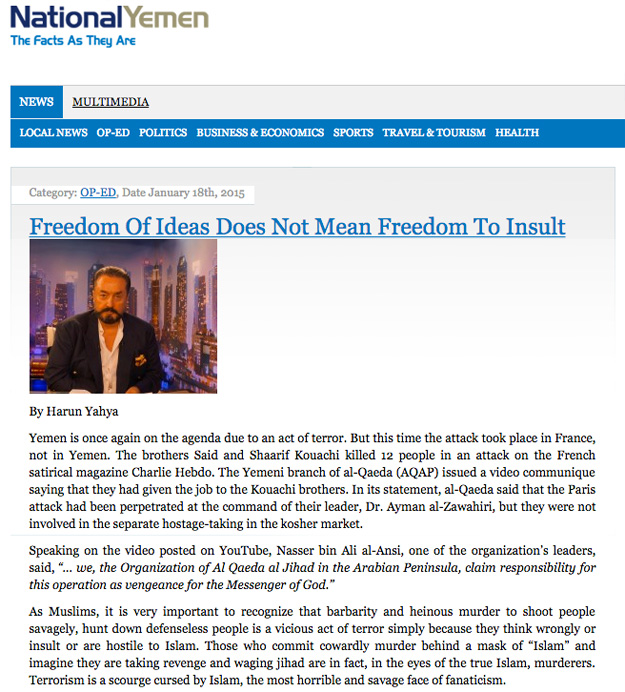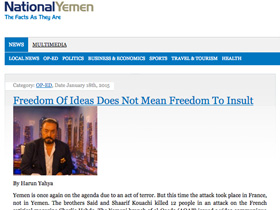
Yemen is once again on the agenda due to an act of terror. But this time the attack took place in France, not in Yemen. The brothers Said and Shaarif Kouachi killed 12 people in an attack on the French satirical magazine Charlie Hebdo. The Yemeni branch of al-Qaeda (AQAP) issued a video communique saying that they had given the job to the Kouachi brothers. In its statement, al-Qaeda said that the Paris attack had been perpetrated at the command of their leader, Dr. Ayman al-Zawahiri, but they were not involved in the separate hostage-taking in the kosher market.
Speaking on the video posted on YouTube, Nasser bin Ali al-Ansi, one of the organization’s leaders, said, “… we, the Organization of Al Qaeda al Jihad in the Arabian Peninsula, claim responsibility for this operation as vengeance for the Messenger of God.”
As Muslims, it is very important to recognize that barbarity and heinous murder to shoot people savagely, hunt down defenseless people is a vicious act of terror simply because they think wrongly or insult or are hostile to Islam. Those who commit cowardly murder behind a mask of “Islam” and imagine they are taking revenge and waging jihad are in fact, in the eyes of the true Islam, murderers. Terrorism is a scourge cursed by Islam, the most horrible and savage face of fanaticism.
As a second point, freedom of thought and expression is very important. Everyone can and must be able to express his opinions freely.
However, insults, and especially insults directed against religious values, are not a form of expression as they contain no thoughts.
One of the most trusted courts on the subject of human rights, and certainly one with the widest powers, is the European Court of Human Rights (ECHR). The ECHR was founded to prevent states from violating their citizens’ individual rights and freedoms in democratic European countries. The court rules on the basis of the European Convention on Human Rights, a text that guarantees minimum rights and freedoms for individuals for the maintenance of democratic regimes in Europe. The rulings of the ECHR have a tremendous influence on judiciaries and state functioning in European countries.
In many of its previous rulings, the ECHR has stated that insulting religious values is not within the scope of freedom of ideas: One such ruling is known as the “Forbidden Phrases Ruling” and concerns an incident that took place in Turkey. The Istanbul public prosecutor alleged that there was blasphemy against “God, the Religion, the Prophet and the Holy Book” in the book entitled “Yasak Tümceler” (The Forbidden Phrases).
On 28 May, 1996, the Istanbul Court of First Instance sentenced the defendant in that case to two years’ imprisonment and a fine, finally commuting the prison sentence to a fine. The Turkish Court of Cassation upheld that judgment on 6 October, 1997. The proprietor and managing director of the publishing house that published the book appealed to the ECHR on the grounds that the freedom of expression enshrined in Article 10 of the Convention had been violated.
In its ruling of 13 September, 2005 on the case originated in the application no. 42571/98, the ECHR said;
“As paragraph 2 of Article 10 recognises, the exercise of that freedom carries with it duties and responsibilities. Among them, in the context of religious beliefs, may legitimately be included a duty to avoid expressions that are gratuitously offensive to others and profane (see, for example, Otto-Preminger-Institut v. Austria, judgment of 20 September 1994, Series A no. 295-A, pp. 18-19, § 49, and Murphy v. Ireland, no. 44179/98, § 67, ECHR 2003‑IX). This being so, as a matter of principle it may be considered necessary to punish improper attacks on objects of religious veneration.”
“A State may therefore legitimately consider it necessary to take measures aimed at repressing certain forms of conduct, including the imparting of information and ideas, judged incompatible with respect for the freedom of thought, conscience and religion of others (see, in the context of Article 9, Kokkinakis v. Greece, judgment of 25 May 1993, Series A no. 260-A, and Otto-Preminger-Institut, cited above, pp. 17-18, § 47).”
“… the present case concerns not only comments that offend or shock, or a “provocative” opinion, but also an abusive attack on the Prophet of Islam. Notwithstanding the fact that there is a certain tolerance of criticism of religious doctrine within Turkish society, which is deeply attached to the principle of secularity, believers may legitimately feel themselves to be the object of unwarranted and offensive attacks …”
After the above statements, the court decided unanimously that freedom of expression had not been restricted.
France is one of the countries in which European Court of Human Rights rulings are binding. In addition, the United Nations, which France is again a member of, has also decreed several times that insulting religious values is a crime. This subject has been in the media a good many times. Therefore, libelous statements against religious values are neither thoughts nor forms of expression. This must be kept in mind not only by France, but also by all European countries.
On the other hand, certain circles may deliberately keep addressing this issue. If states and ECHR’s rulings fail to stop such aggressive acts, what should Muslims do?
Muslims should definitely not resort to any act of violence.
The barbarity called “terror” is the work of ignorant and bigot people who are remote from the Qur’anic morality, people who are in fact murderers who have nothing to do with faith. We need to remember that all kinds of terrorist acts are violence and corruption in the view of Islam.
Terrorists commit such violence only with the intention of attacking religion itself. It may well be that those who carried out this violence did so to present religion as evil in the eyes of people, to divorce people from religion and to generate hatred towards those who are religiously inclined. Consequently, every attack on undefended and innocent people is actually an attack made against religion.
The cultural solution to these people and groups who perpetrate violence under the guise of religion, no matter which, is to teach people the true teachings and morality of Islam. In other words, Islam and Qur’anic morality do not support terrorism or terrorists, but in fact is the cure to save the world from the scourge of terrorism.
What Muslims should do in the face of attacks against Islam is to struggle by means of the law, ideas and knowledge and this is what the reason, logic and the law requires. This attitude is the one compatible with the moral values of the Qur’an that Allah expects of Muslims.
Adnan Oktar's piece on National Yemen:
http://nationalyemen.com/2015/01/18/freedom-of-ideas-does-not-mean-freedom-to-insult/


